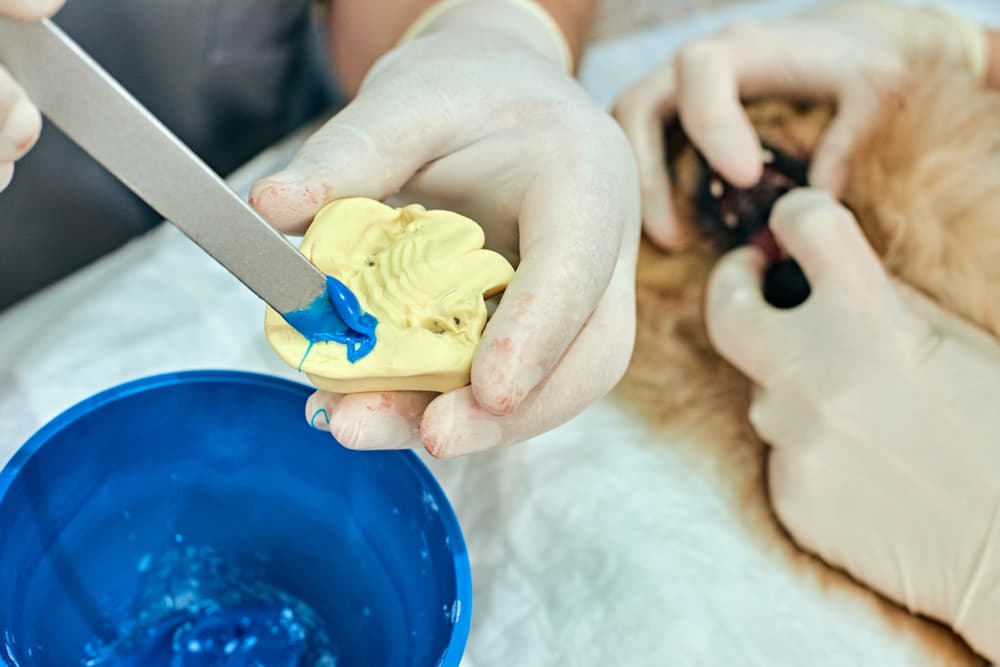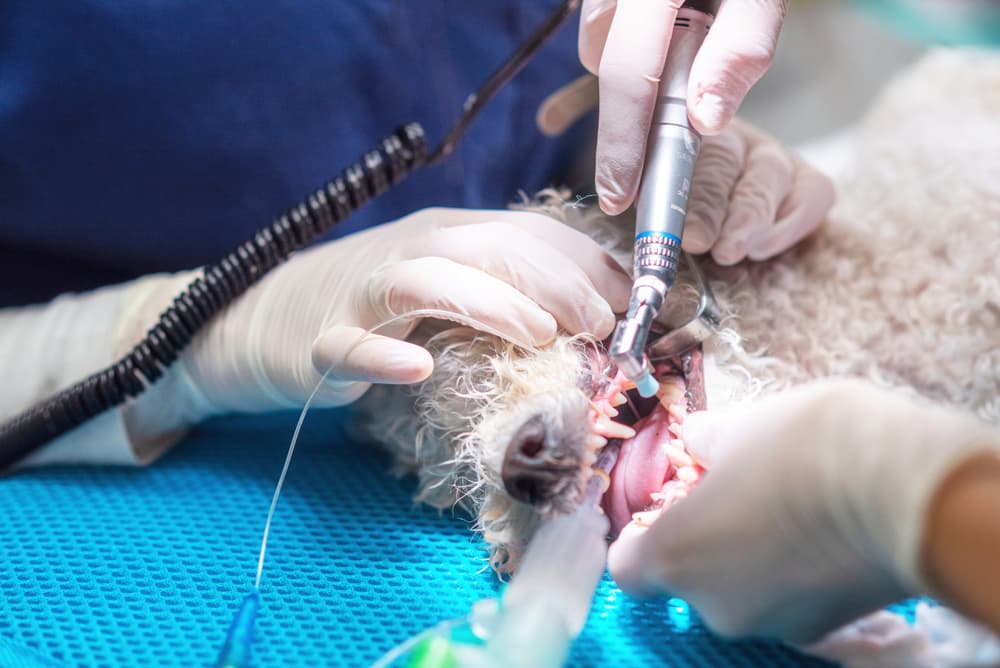Can Dogs Get Dentures?

If your canine companion is one of the estimated 80 percent of dogs with some level of periodontal disease, tooth loss may be an issue. Given that our dogs have access to dental procedures like cleanings and tooth extractions, it’s not a stretch to wonder: can dogs get dentures?
Although most dogs can get by without their teeth, in some cases veterinarians may recommend dental implants (doggie dentures aren’t a thing). We’ve broken down what to know about this topic, though only your veterinarian can ultimately decide if dog dental implants are a good fit.
Can Dogs Get Dentures?
Humans wear dentures (AKA false teeth) to replace a partial or full mouth of missing teeth. Well-fitting dentures facilitate more effective chewing, and thus optimal nutrition. They also allow the wearer to feel more confident while smiling and talking. Typically made of a resin or metal base with porcelain or plastic teeth, dentures get removed for cleaning or when they’re not being used.
But can dogs get dentures like humans? Maybe you’ve seen pet food ads of dogs with exaggerated dentures or images of dogs “wearing” dentures they’ve snatched from their owners. However, legitimate images of dentures for dogs don’t exist because they’re not something veterinarians offer. For one, dogs are unable to use dentures in the same way as humans do.
“Dogs’ jaws and oral structures differ significantly from humans, making it difficult to create and fit functional dentures for them,” says Dr. Gabrielle Fadl, director of primary care at Bond Vet, based in New York City.
Dentures also need to be properly cleaned, cared for, and adjusted when needed, Dr. Fadl adds, “which is challenging for dogs and their owners to manage effectively.”
Dog dentures, if they were to exist, could also pose a potential safety hazard. “They would easily fall out, break, get lost, maybe even ingested,” says Denise S. Rollings, a certified veterinary technician, veterinary technician specialist (dentistry), and founder of Pet Dental Education.
Can Dogs Get Dental Implants?
Although dog dentures aren’t an option, some veterinary dentists do offer dental implants for dogs, which are permanent structures. “Dental implants are surgically placed into the jawbone, providing a stable foundation for prosthetic teeth,” says Dr. Fadl. The screw used to anchor the tooth is made of titanium, a strong and durable, yet lightweight metal; and the implanted tooth is ceramic or porcelain (1). After the screw has been placed, it takes between two and six months for it to fuse with the bone.
An impression is made and then sent to a dental lab for production of the prosthetic tooth (2).
Dental Implants for Dogs: How Common Are They?

While dog dental implants may be available, veterinarians don’t routinely offer this procedure. “In dogs it is a cosmetic procedure, not a medically necessary one. Dogs do not have the same emotional attachment to their teeth as people do, nor do they have social pressures to look a certain way,” says Rollings.
Getting dog dental implants is also an involved, multi-procedural process, each segment requiring anesthesia (1). Aside from the tooth extraction and placement of the screw into the jawbone, the process involves getting impressions of the tooth that needs replacement, taking radiographs, performing any requisite blood tests, and installing the new tooth. This doesn’t include any visits that may arise due to complications.
“There is no need to put a dog through this procedure,” says Rollings.
In a piece published in the Journal of the American Veterinary Association (JAVMA), a group of veterinary dentists maintain that there is not enough evidence yet to justify its widespread use in dogs (2). For now, the veterinary community generally believes that the potential risks of dog dental implants outweigh any health or quality-of-life benefits.
Dog Teeth Implants: Are They Even Needed?
Dogs can learn to adapt reasonably well without all their teeth, especially if the missing teeth are primarily molars and not critical front teeth, says Dr. Fadl. “Dogs have different types of teeth for various functions, such as tearing, cutting, and grinding, so losing some teeth might affect their ability to chew certain foods. However, they can still manage to eat a balanced diet with softer foods or smaller kibbles.”
One class of dogs more likely to be fitted with dog dental implants are military and police dogs. Because of the activities these working dogs are engaged in (like grabbing, holding, and gnawing), their teeth have a propensity toward breakage. And without a full mouth of functional teeth, they would need to be retired early.
Pros and Cons of Dog Dental Implants

If you’re considering dog teeth implants for your dog, ask your veterinarian to refer you to a veterinary dentist. Only a veterinary dentist can ultimately determine if implants are a good fit for your dog. “The decision depends on the individual dog’s health, age, and other factors,” says Dr. Fadl.
Potential Pros
- Improved chewing ability. Having a full set of teeth can, in theory, lead to improved chewing for the dog and thus better nutritional absorption. Veterinarians say, however, that most dogs can adapt to eating without all of their teeth.
- Preservation of the jawbone. Dental implants can help preserve the jawbone after a tooth extraction. The degree of jawbone loss in dogs, however, is not as extreme as seen in humans, veterinarians say (2). And while facial structural changes are a concern in humans, dogs aren’t particular about how they look.
- Maintained teeth alignment. Another purported benefit of dental implants is that they can help maintain the position of neighboring teeth after extraction. Due to the size and shape of the dog’s dentition, though, their teeth don’t shift like ours do following extraction (2).
- Helpful for working dogs. Police and military dogs rely on their teeth more than pet dogs do, and they’re more prone to losing them while working. Titanium dog teeth implants can prevent working dogs from having to retire early.
Potential Cons
- There’s not enough data. While dental implants are considered safe and beneficial for humans, peer-reviewed studies demonstrating their use in dogs are lacking. Since dogs can generally do well without a full set of teeth, veterinarians may be hard-pressed to take unnecessary risks.
- It’s a complex procedure. Getting a dog fitted with dental implants is a drawn-out process that involves multiple procedures, each requiring anesthesia. Aside from any necessary teeth extraction, this process involves taking an impression of the teeth to be replaced, placement of the new teeth, and a possible bone graft (1). Performing a bone graft may be an issue if the affected teeth are in the front lower portion of the mouth — this is an area that veterinarians are unable to successfully graft.
- There are risks associated with surgical procedures. All procedures associated with dog dental implants require the use of anesthetics. While anesthesia is generally considered safe, it’s not without its risks. And because multiple procedures are involved, the risks are statistically greater. Complications like swelling, pain, and infection can also arise after dental procedures, says Dr. Fadl.
- There are no guarantees. There’s a possibility that the procedure might not be successful. “Implants might fail to integrate with the bone, leading to additional procedures or a need for alternative solutions,” says Dr. Fadl.
- They are pricey. Aside from the cost to replace the tooth, other expenses associated with dog dental implants include the tooth extraction, anesthesia, office visits, radiographs, blood work, bone grafting, and medications.
Cost of Dog Teeth Implants
Since veterinary dentists don’t commonly perform dog dental implant procedures, it’s difficult to find specifics on pricing. Generally, however, the cost starts at about $2,000 for just one tooth.
This may not include other charges, like tooth extraction, anesthesia, bone grafts, follow-up visits, blood work for dogs with certain health conditions, x-rays, and any necessary pain medications or antibiotics.
While pet insurance companies may cover some dental procedures, they typically don’t cover cosmetic procedures, which dog dental implants are categorized as.
Dog Missing Teeth: Other Ways to Help

Diet is key to helping a dog with no teeth. “Ensuring a soft or smaller kibble diet that is easier to chew” can help, says Dr. Fadl. Though it goes without saying, she adds that it’s essential to monitor your dog’s eating habits and provide adequate veterinary care to ensure the dog’s health.
The best way to prevent missing teeth in dogs is to adhere to a good oral hygiene routine. “The body’s response to bacterial plaque in the mouth is what causes periodontal disease (ultimately tooth loss). The gold standard is teeth brushing to mechanically remove bacterial plaque,” says Rollings.
Choosing an appropriate toothbrush can help facilitate successful brushing sessions. The toothpaste you use on your dog must be formulated specifically for use in pets, as human toothpaste can be toxic for them.
Dr. Fadl also recommends offering your dog dental chews or toys designed to reduce plaque and tartar buildup. Veterinarians say oral rinses and dental wipes are also an option.
Keeping regular veterinary appointments to address issues before they can worsen and having your dog’s teeth professionally cleaned on an annual basis is also important.
If you do opt for dog dental implants, Rollings says the work should be performed by a veterinarian trained in oral surgery with designated trained staff to monitor anesthesia.
References
- Dear Doctor: Dental Implants for Dogs. (2022, February). Your Dog. Tufts University – Cummings School of Veterinary Medicine. Retrieved from https://www.tuftsyourdog.com/doghealthandmedicine/dear-doctor-dental-implants-for-dogs/
- Tannenbaum, J., Arzi, B., etal. (2013, December). The case against the use of dental implants in dogs and cats. Journal of the American Veterinary Medical Association. American Veterinary Medical Association. Retrieved from https://avmajournals.avma.org/view/journals/javma/243/12/javma.243.12.1680.xml









